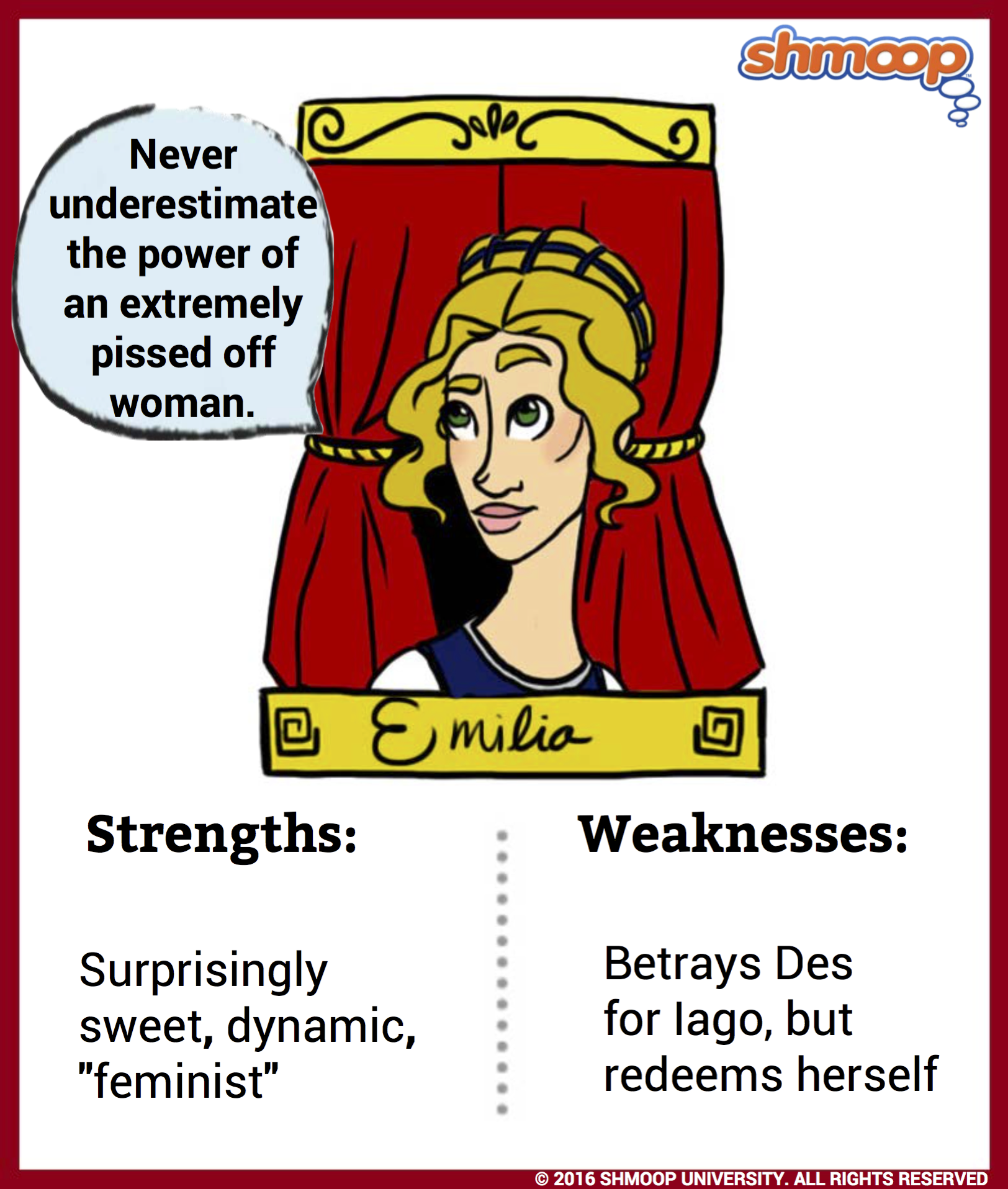Character Analysis

(Click the character infographic to download.)
Desperate Housewife
You'd be desperate and jaded too if you realized that monogramming "Mrs. Emilia Iago" on all your towels meant that... you were married to Iago.
Because here's the thing: Emilia is actually a total sweetie. She's just trapped in a marriage to possibly the most malevolent Shakespearean villain ever.
Older and more cynical than Desdemona, Emilia develops a close relationship to young Des. It's actually pretty aww-inspiring: Emilia and Desdemona bond over husband trouble. Emilia's super-bitter take on her married life with Iago contrasts with Desdemona's (temporarily) idealistic marriage to Othello.
Emilia's one dishonest act towards Desdemona—stealing her special handkerchief—turns out to have devastating consequences. The loss of the handkerchief is what convinces Othello that Desdemona is guilty of infidelity, and Emilia's little theft ends up causing her friend's death (at least in part).
But she redeems herself, or at least gives a good shot at trying. It's Emilia who discovers the truth about Iago's plotting and reveals it to the world. She can't bring Desdemona back to life, but she does clear her friend's name. She ends up sacrificing her life so that Desdemona won't be remembered as a "whore." Iago kills Emilia as payback for unmasking him, but Emilia dies proud that she set the record straight.
Breaking Up Is Hard to Do (When You're a Wife in 1604)
Emilia's relationship with Iago really seems like a marriage made in hell.
Iago constantly mocks and disrespects her. He never seems to offer her any affection, and he always talks trash about women in general. Despite this (or because of this—Stockholm Syndrome's no joke) Emilia seems eager to please him. She steals Desdemona's handkerchief in the hope that Iago will appreciate her for once. "I nothing but to please his fantasy," she says as she does so (3.3.343).
But her attempt to make the handkerchief hand-off a teasing, flirtatious interaction fails miserably: Iago grabs the handkerchief and tells her to go away. Later, it seems like Emilia is aware of Iago's thirst for power and wishes she could gratify it. She asks Desdemona, "Who would not make her husband a cuckold to make him a monarch? I should venture purgatory for 't" (4.3.85-87).
So Emilia ends up seeming like that horrible stereotype: the poor girl with no self-confidence who's stays with a total dirtbag because she craves affection. Emilia goes so far as to betray her friend for the love of her man. And yet, despite her submissiveness, Emilia's obvious bitterness boils over in a final scene during which she says that husbands are usually to blame when their wives cheat on them:
EMILIA
But I do think it is their husbands' faults
If wives do fall. Say that they slack their duties,
And pour our treasures into foreign laps;
Or else break out in peevish jealousies,
Throwing restraint upon us. Or say they strike us,
Or scant our former having in despite.
[...]
The ills we do, their ills instruct us so. (4.3.97-115)
After all, men cheat on women all the time—why shouldn't women have an equal right to infidelity?
Considering that this was written in the early 1600s, Emilia's monologue is about as close as we will get to a feminist manifesto. But like Shylock's "Hath not a Jew eyes" speech in Shakespeare's Merchant of Venice, it's not perhaps the best argument for equality. Shylock argues that Jews are people, too—and so they have an equal right to revenge. Emilia argues that women are people, too—and so they should have an equal right to cheat on their spouses. These aren't the most uplifting messages.
Throughout most of the play, Iago has the upper hand in his interactions with his wife. But the final scene is payback time for Emilia. Shakespeare scholar Harold Bloom points out that of all the people in the play, Emilia is the only one that Iago underestimates—and she's the only one who ultimately can bring Iago down. That's an interesting irony. Iago, who is so good at predicting and manipulating other people's behavior, only fails to understand one person... the person he should have known best.